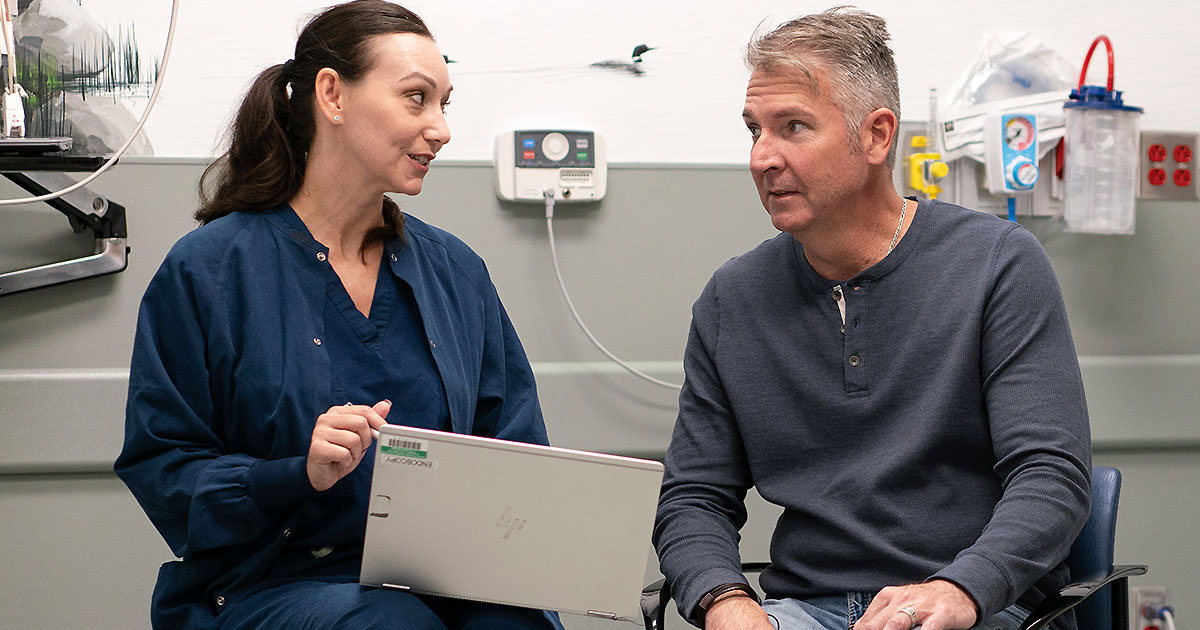
Cancer may upset your body’s metabolic balance, meaning your nutritional needs may change, as well as your ability or desire to eat. As a result, you may lose weight from the cancer itself or side effects of treatments.
These changes and others may result in malnourishment, which may pose serious consequences for your quality of life, increase hospital stays, raise the risk of cancer recurrence and diminish your ability to tolerate and respond to cancer treatment.
A 2023 study, published in the British medical journal The Lancet, showed an association between severe malnutrition in cancer patients and poorer outcomes with an increased risk of earlier death. This latest research, which confirmed earlier findings, involved nearly 6,000 adult colorectal and gastric cancer patients in 75 countries. An earlier meta-analysis in the European Journal of Clinical Nutrition found similar links between malnutrition and poor outcomes.
While scientists say more research is needed into the complexities of malnutrition, weight loss and cancer outcomes, a 2015 study in the Journal of Clinical Oncology found that cancer patients who maintained a Body Mass Index (BMI) at or above 28—within the healthy range for weight—survived almost five times longer than those who lost 15 percent of their body weight and had a BMI of 22 or less.
“Nutrition status can affect a patient’s strength and energy to recover from chemo, radiation or surgery,” says City of Hope Advanced Clinical Dietitian Kara Sonntag. “It may also compromise their immune system making them more susceptible to infections. In addition, muscle loss can result in weakness and fatigue that then can lead to further decreases in intake, which becomes a challenging cycle to break.”
The key is early identification and promptly addressing malnutrition and its underlying cause, Sonntag says, adding that one of the most damaging consequences of malnutrition is a delay in cancer treatment. “I always tell my patients, ‘If you can’t eat; we can’t treat,’” she says.
In this article we will explore:
- What is malnutrition?
- How common is malnutrition among cancer patients?
- Is malnutrition more common with certain types of cancer?
- Signs and symptoms of malnutrition
- Malnutrition treatment
If you’ve been diagnosed with cancer and are interested in a second opinion about your diagnosis or treatment plan, call us or chat online with a member of our team.
What is malnutrition?
Generally, the Academy of Nutrition and Dietetics, the professional association for nutritionists and dietitians, says malnutrition is characterized by:
- Insufficient intake of energy (nutrients, calories) to meet your needs
- Unintentional weight loss
- Loss of muscle mass, also known as sarcopenia
- Loss of subcutaneous fat
- Localized or generalized fluid accumulation, which may mask weight loss
- Diminished physical function as measured by hand-grip strength
A diagnosis of malnutrition is made if at least two of these characteristics are present, Sonntag says, noting that malnutrition may result from a chronic disease like cancer as well as acute diseases or starvation.
To assess your risk for malnutrition, your clinical dietitian or nutritionist may use the Nutrition Risk Screening 2002 tool (NRS 2002), which is a 5-question survey. This nutritional screening tool may help clinicians prevent and catch signs of malnutrition early before too much weight or muscle mass is lost.
How common is malnutrition among cancer patients?
A 2019 editorial in ASCO Oncology Practice estimated 20 percent to 80 percent of cancer patients are malnourished, but the statistics are dependent on many factors including age, disease site and stage of cancer.
An Italian study in 2017 found that among 1,952 cancer patients at their first oncology visit, more than half (51 percent) had “nutritional impairment,” 9 percent were obviously malnourished and 43 percent were at risk of malnutrition.
While an exact statistic may require more research, experts do agree that malnutrition is something to monitor closely in cancer patients. Malnutrition should be treated as a distinct disease. The best option is prevention, but failing that, it must be promptly identified and treated to help lessen complications of cancer and cancer treatments and improve clinical outcomes.
Is malnutrition more common with certain types of cancer?
Malnutrition in a cancer patient may be more likely if:
- The cancer affects how the body digests, metabolizes food or absorbs nutrients—common in cancers of the stomach, intestines, pancreas or liver
- A tumor physically blocks any part of your digestive track or effects your ability to chew or swallow—common in cancers of the head and neck or esophagus
For these reasons, up to 90 percent of patients with gastrointestinal cancers may have nutritional deficiencies.
Research has shown that cancer cachexia—the loss of body weight, muscle mass and weakness and may be the result of malnutrition—occurs in:
- 80 percent of those with stomach, pancreatic or esophageal cancer
- 70 percent of those with head and neck cancers
- 60 percent of those with lung cancer or colorectal cancers
Determining the mechanism or relationship between the cancer and malnutrition may be a complex task, complicated further by the fact that oftentimes, cancer treatments may also be a factor.
Surgery may drain your body of energy and nutrients, while chemotherapy or radiation treatments may make you vomit or feel nauseous, dampen your appetite or cause taste changes that may make food less appetizing, cause mouth sores, dry mouth or difficulty swallowing. The psychological stress that comes with a cancer diagnosis and treatment may impact your desire to eat as well.
Even if you seem to have sufficient food intake or are eating plenty of calories, the cancer may make it more difficult for your body to absorb sufficient protein, carbohydrates and fat to adequately maintain muscle mass. This is because cancer may change the way the body absorbs nutrients and can sap energy. Those who may appear overweight or with obesity may actually be malnourished due to the metabolic changes caused by the cancer or the treatment.
Signs and symptoms of malnutrition
Malnutrition may be characterized by several markers.
Weight loss
Sonntag says, “weight loss usually is the first and most obvious trigger that would flag for a registered dietitian evaluation.” But she adds that weight loss may be just one sign of malnutrition.
You may be losing weight even before your initial oncology visit, perhaps because of a loss of appetite. Identifying this early may lead to nutritional interventions to avoid malnutrition and further complications.
Other symptoms you may notice due to the cancer or treatments may include:
- Mouth ulcers
- Diarrhea
- Vomiting
- Pain
These symptoms and side effects may make eating uncomfortable and help promote weight loss. A less obvious symptom to you, but which your health care team is trained to identify, is your body’s inability to properly absorb nutrients.
Sarcopenia
As part of the normal aging process adults tend to lose about 0.3 percent of their muscle mass each year. This condition is called sarcopenia.
You may lose up to 3.3 percent of muscle mass each year, which may be another marker of malnutrition.
If you undergo chemotherapy or radiation treatments, sarcopenia may occur 10-25 times more rapidly than most and those who receive bone marrow transplants may have even greater loss of muscle mass, she says.
Weakness
Depleted stores of fat and lean muscle mass may lead to reduced strength and ability to physically function as you once did.
Malnutrition treatment
The first step in treating malnutrition is identifying a possible cause, keeping in mind that every patient’s situation is unique.
“Interventions vary based on the underlying causes of the individual’s malnutrition as well as treatment goals,” Sonntag says. “They can be as simple as additional food or snacks, nutrition protein shakes, fortifying foods or modifying textures, consistencies or assistance with self-feeding.”
Education on proper nutrition and eating nutrient-dense foods instead of empty calories found in many ultra-processed foods may be an important part of addressing malnutrition risks. Nutritional supplements may be prescribed.
If you are experiencing nausea or vomiting or gastrointestinal distress, medications may help alleviate those symptoms allowing you to consume the necessary nutrients. Other simple steps you may take include:
- Drinking plenty of water
- Eating small, frequent, protein-rich meals
- Adding peppermint or ginger, an appetite stimulant, to your diet
A clinical dietitian may develop a meal plan tailored to your particular situation to help you get the nutrition you need. They may also recommend a feeding tube that delivers nutrients directly to your stomach.
As Sonntag says, “the diagnosis of malnutrition flags nutrition professionals to consider further evaluations for micronutrient deficiencies,” because promptly evaluating and addressing any possible symptoms of malnutrition is crucial to cancer care and to positive outcomes.

Nutritional support at City of Hope
Nutrition support providers at City of Hope have long been aware of the potential consequences of malnourishment and do a nutritional assessment of every patient for malnutrition at their initial visit.
At City of Hope, patients receive nutritional support from registered, oncology-trained dietitians, helping them maintain their body weight and strength, while addressing nutrition-related deficiencies and dealing with diet-related symptoms they may experience. A dietitian, trained and educated in nutritional care, evaluates the patient’s nutritional status and makes recommendations for staying nourished with healthy foods and a well-balanced diet.
Carolyn Lammersfeld, Vice President of Integrative Care at City of Hope Atlanta, Chicago and Phoenix says she urges cancer patients to take advantage of the nutritional support services available to them.
“No matter where you receive your cancer treatment, it’s important to work with a nutritional support team,” she says. “They are trained and experienced in working with cancer patients, who have very specific nutritional needs.”
If you’ve been diagnosed with cancer and are interested in a second opinion about your diagnosis or treatment plan, call us or chat online with a member of our team.



